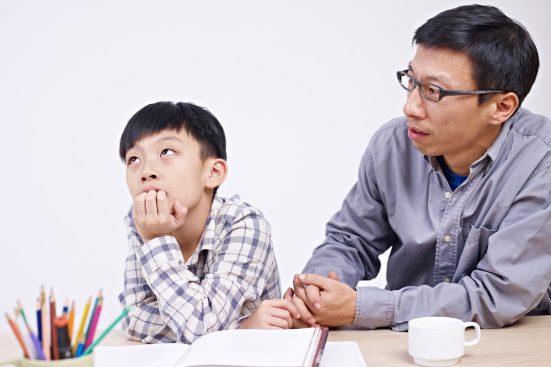An article published by the Australian Psychological Society in 2009 estimated that 50,000 children in Australia each year experience separation and divorce each year. This means as professionals who work with children, we are likely to have many children in our classrooms and therapy rooms who are experiencing this life change at any one time.
There is wide variability in how much distress children experience after family changes. Some children find the experience pretty hard going for a while. They might feel sad, worried about the future, irritated, guilty or frustrated. Sometimes these feelings show themselves as challenging behaviour, becoming “clingy”, crying, “acting out”, getting more frustrated than normal, anxious behaviour or struggles with friends or learning at school.
However, other children manage separation and family changes really well. They might experience a “bump” with some short term struggles – but then move on quickly. For other children, the new situation is actually a change for the better. Some research suggests that family conflict is the greatest stressor – so if family separation results in less daily conflict – then these kids may experience less distress than they did prior to the separation.
As professionals who see these kids – we can help make this process less traumatic for children – either directly through our interactions with them, or by supporting their families to support them.
I think it is important to acknowledge that there are no precise formulas of course about how parent/families must manage the situation. In my experience there are many different ways families manage well – depending on their situation and the needs of their own children. Here are some of the helpful steps I have seen families take to help children adjust:
* Many parents/carers support kids to have a positive relationship with both parents/carers.
Eg *When Jane and John separated, they worked really hard to avoid speaking negatively about each other in front of the children, made sure the kids had enough time and contact (phone calls, skype etc) with the other parent and not only didn’t criticise each other – actually spoke positively about the other parent.
* Many parents/carers work hard to provide children with consistency and predictability about who they are going to see and when, and what their routines and living arrangements will be.
Eg Tom made a roster for his daughter about when she was seeing her maternal grandparents, (with whom she had been really close) and put it on the calendar so she could see in advance when she was going there.
* Many parents/carers continually reassure children that they are loved, the life changes are not their fault and that there will be happy times ahead.
Eg 10 year old Joseph was worried his arguments meant his carers had split up. All of the people in his life wrote him a letter for him – about how much he was loved, and what they would do to make sure he had a good year – and he read this whenever he was worried.
*Many parents/carers are careful to protect kids from “adult” or scary information about conflict, finances or new relationships.
Eg Sally told her 9 yo son and 7 year old daughter “that’s adult stuff” when they asked about money after she moved out of the family home. She said “we will organise it and sort it out” in a confident voice and changed the topic.
*Some parents/carers rearrange their life to spend extra time with them in order to allow questions and conversations to naturally occur.
Eg After 11 yo Susan had moved from one carer home to another, her new carer organised for Susan to skip homework for a few weeks so she could have more time for games/park trips etc, so that Susan could talk about her worries if she wanted to.
Many parents/carers know the importance of taking extra care of their social and sleep needs in times of changes
Eg Theo and Erica talked together about making sure they were on the same page about bedtimes in the few months after their separation, and also re-arranged schedules so that their boys had playdates as needed during that time.
What can we do as professionals?
There are various ways we can support children in the midst of family changes. We can:
1. Talk about the normality of family changes – in conversations and our language about family, we can refer to the fact that it is normal for family structures to change over time.
2. Ask parents/carers/family members if there is anything we can do to support the child – as always, close communication with family is key. Sometimes parents/carers tell me they’d appreciate it if I initiate a conversation with their child, or provide some information to their child about this issue.
3. Give kids have the opportunity to tell us their worried and sad thoughts after big changes – if they’d like to.
Of course opening up conversation channels isn’t always easy as children don’t have the same communication skills as we do generally – and then in times of stress, often these communication skills reduce further.
In my work with kids over the years I’ve developed a checklist about worries related to separation/family changes. It’s a list of “worried/sad/frustrated thoughts about family changes some kids have” and is basically just a list of potential worries I’ve seen children experience in these times.
It’s important to note that not all children have all – or even any – of these concerns. But some do – and it’s usually more useful if they can express them to us. This checklist might be useful to you in either helping children to specifically express their worries to you (if you have permission from the family) or just to be aware of some of the more common sad/worried thoughts children might have, so I’ve copied it for you below.
If you are getting a child to talk with you about this, one option is to copy and paste the questions below into a word document, fill in the names of carer 1/carer 2 – ie Mum/Dad if this is appropriate) and ask a child to rate each “worried /sad thought” on a scale from 1-10, where 1 means – this is not something I worry about and 10 means I worry about this a lot.
Here are the potential worried/sad thoughts:
I feel like I am a bit different from other kids now (?/10)
I’m feeling worried about Carer 1 (eg Mum/Dad) or how he/she is going (?/10)
I’m feeling worried about Carer 2 (eg Mum/Dad) or how he/she is going (?/10)
I want to spend more time/live more of the time with (name of one carer) (?/10)
I want to spend more time/live live more of the time with (name of another carer) (?/10)
I’m Sad/worried about Christmas/birthday and other specials days (?/10)
I think maybe I did something wrong to make this happen (?/10)
(Name of one carer) will like/love me a bit less now (?/10)
(Name of other carer) will like/love me a bit less now (?/10)
I don’t know what I can say to Carer 1 about Carer 2 or what happens at Carer 2’s house (?/10)
I don’t know what I can say to Carer 2 about Carer 1 or what happens at Carer 1’s house (?/10)
I want to spend more time/live with both carers both together (?/10)
I’m angry at carer 1 because this is all his/her fault (?/10)
I’m angry at carer 2 because this is all his/her fault (?/10)
Something else I’m worried/sad/angry about is…….(?/10)
Calm Thoughts
Once you have a list of worried/sad thoughts – then you can work together with the child to come up with some “calm thoughts” instead. These are sentences the child can use to help reassure themselves about the separation and their future.



